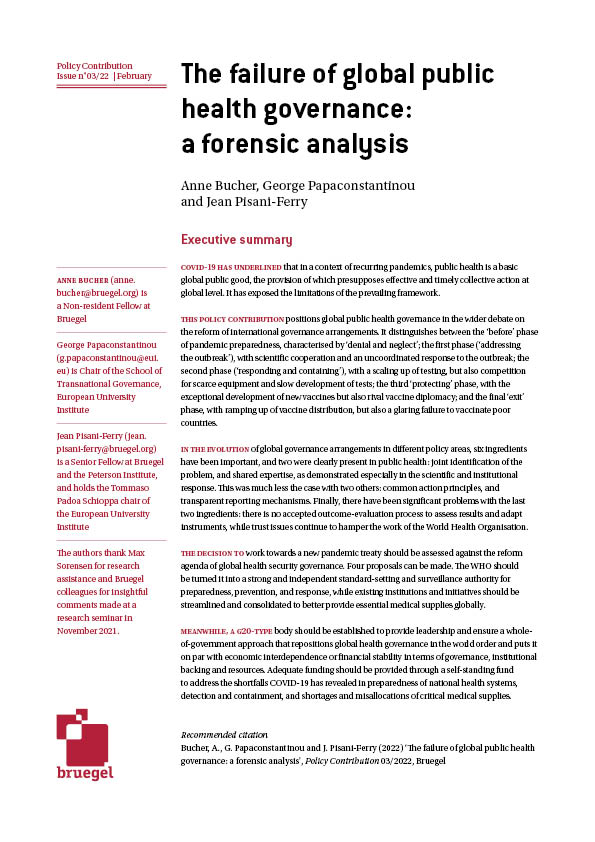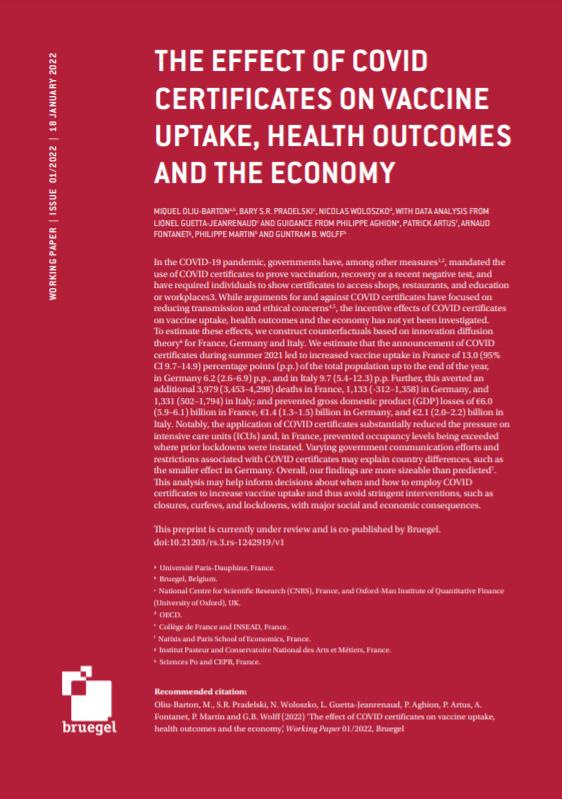Blog Post
Social distancing: did individuals act before governments?
Using online searches for restaurants as a proxy to assess whether and to what extent individuals were practicing social distancing before strict lockdown measures, we identify substantial differences between countries. In some countries, including Denmark and Portugal, searches for restaurants were considerably down before restaurant restrictions were put in place. Countries where social distancing started earlier, regardless of when policies were enacted, can expect a flatter coronavirus curve.
Behavioural change is a fundamental determinant of the spread of an epidemic. Toxvaerd (2020) showed how behavioural parameters change predictions in standard epidemiological models. Even when individuals are considered in models to be purely self-interested, they are bound to engage in some degree of social distancing by choice and thus help reduce the growth rate of the number of infections, compared to that predicted by epidemiological models. Toxvaerd (2020) suggests social distancing is greater when the disease is more contagious and health effects more severe.
Individuals act on the basis of their beliefs about how contagious a disease is and about how severe its effects are. Moreover, they are not necessarily self-interested, but might consider how their actions affect others. Differences in information, risk-aversion and self-interest, and expectations about how well prepared the health system is to deal with the inflow of patients, will lead to different choices in terms of the degree of voluntary social distancing.
We used Google Trends to identify when individuals started engaging meaningfully in social distancing in different European countries. We used searches for the topic ‘restaurant’ because visiting a restaurant reflects a choice to leave the house, as opposed to trips people might be required to make[1].
We compared each day of the week in February and March 2020 with the same day of the week in January. For example, average Mondays in February and March were compared with average Mondays in January, with the average of January Monday searches set to 100. We plotted a seven-day moving average of this index to show trends and reduce weekly seasonality. The use of this moving average means values depicted lag actual reductions in searches. We plotted the same series for 2019, which show that February and March average searches are slightly above January. Peaks around events such as Valentine’s Day and Carnival (in Portugal) are noticeable.
Figure 1 shows the results for three countries, and notes in each case the start date of strict lockdown measures, and, where relevant, the date of implementation of initial measures that restricted opening hours or numbers of clients.
Figure 1: Searches for ‘restaurants’ from 8 January to 30 March in Denmark, France, Spain (January average = 100)
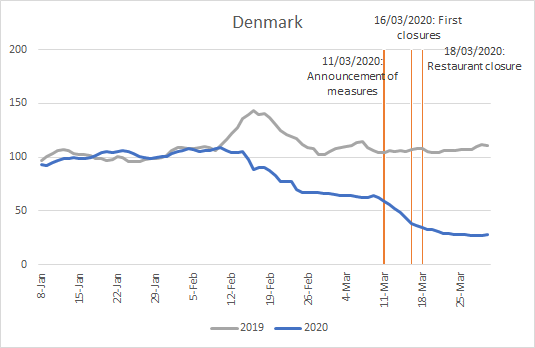
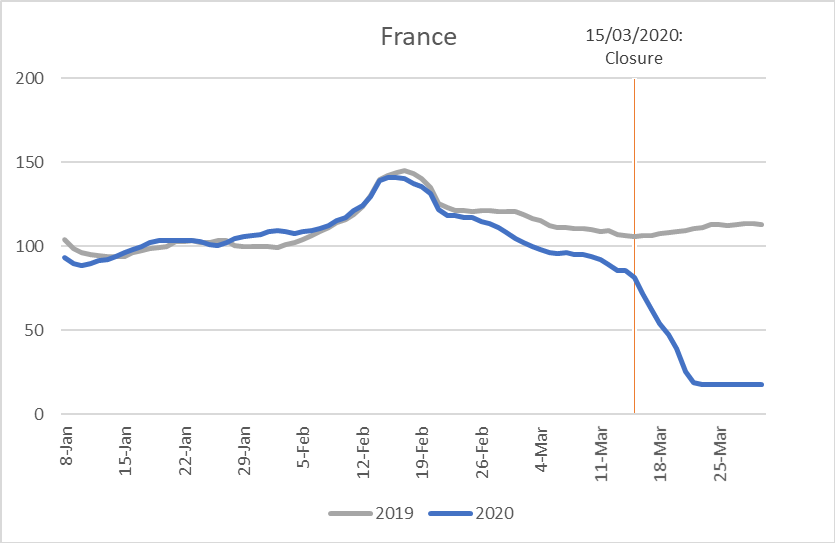
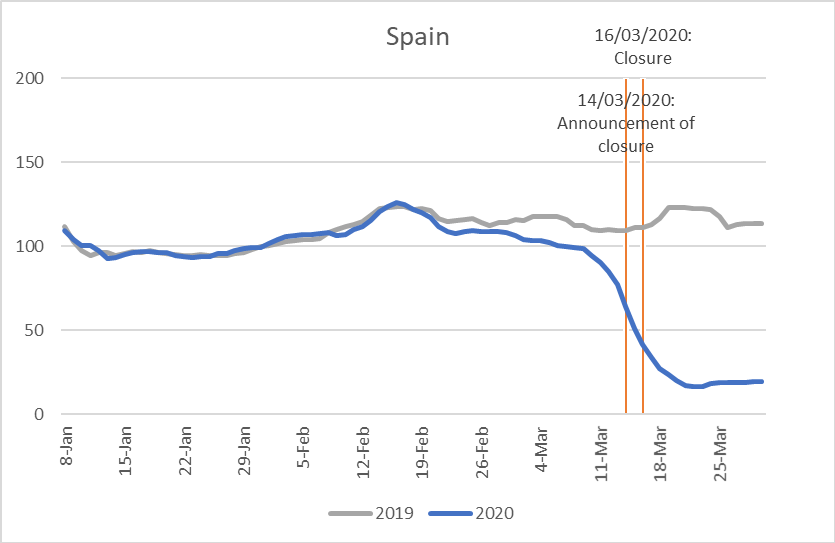
Source: Bruegel based on Google Trends.
Figure 1 shows significant differences between the three countries. Denmark was one of the first countries to impose strict limits on social gatherings but even before, individuals started to reduce their social contacts. A downward trend in restaurant-related searches is visible for Denmark starting on mid-February. These factors might have contributed to the controlled growth of cases in Denmark, whose prime minister on 30 March hinted at the possibility of gradually re-opening the country.
This pattern is entirely different from the same variable plotted in 2019, where searches did not decrease in February/March compared to January, and a Valentine’s Day peak was observable.
For France and Spain, the decrease in searches for restaurants before lockdown measures were implemented was smaller. In Spain, there was a sudden 25% drop three days before full closure, most likely partly related to the announcement made on 14 March and to the critical situation in Madrid.
Figure 2: Searches for ‘restaurants’ from 8 January to 30 March in Italy, Portugal, Germany (January average = 100)
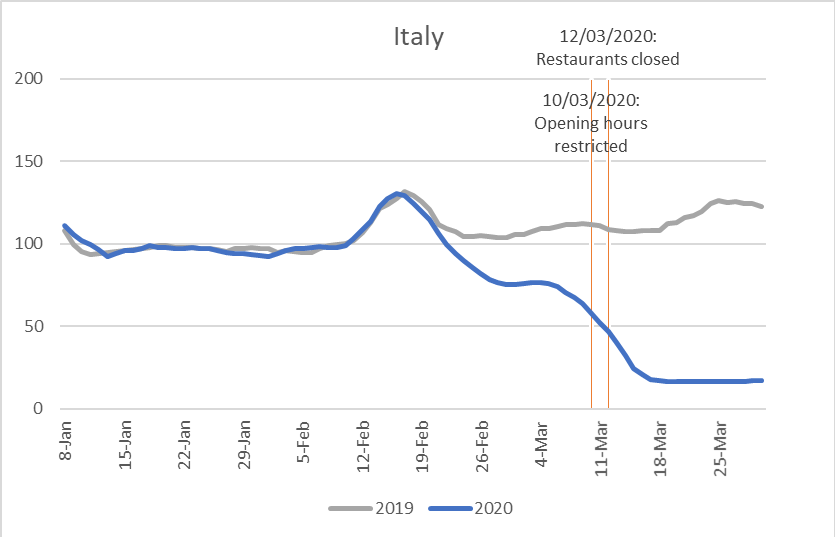
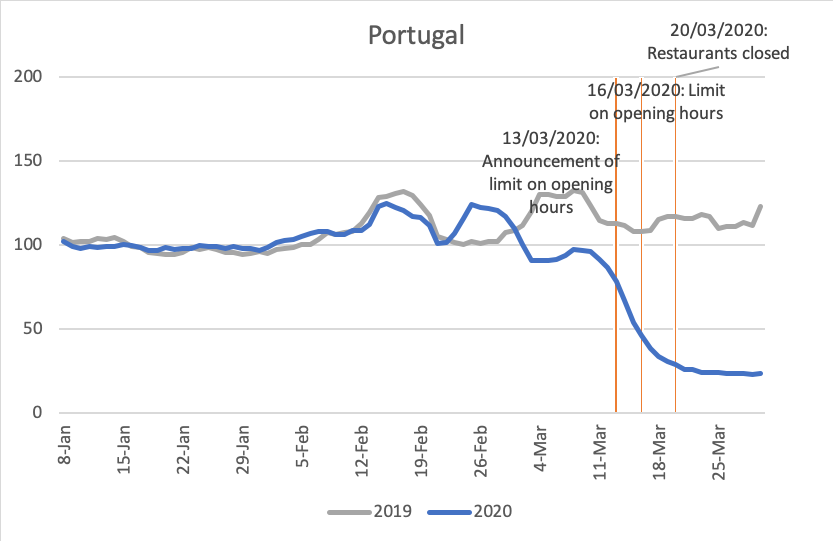
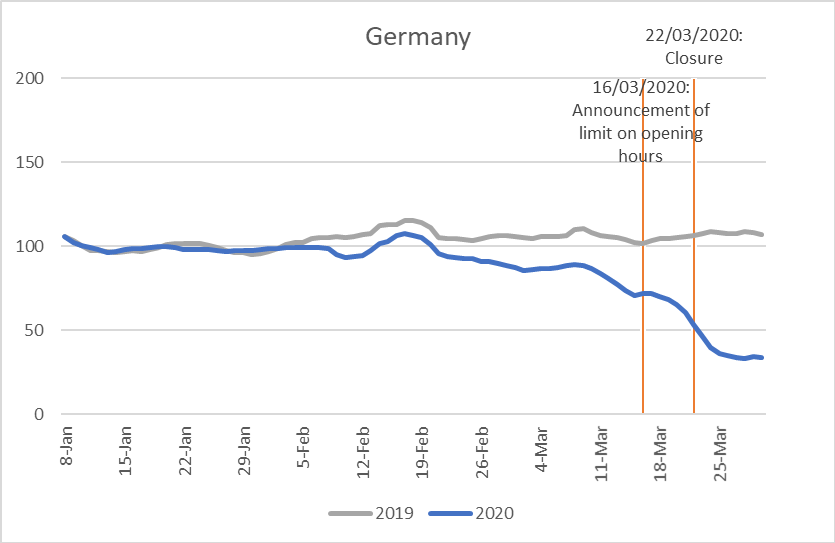
Source: Bruegel based on Google Trends.
Figure 2 shows that in Italy, there was already a decrease in searches for ‘restaurants’ before national lockdown, most likely partly related to the dire situation and restrictions in Lombardy and to the fact the announcement preceded implementation.
In Portugal, compared to January, a decrease in the number of searches for restaurants was visible from 11 March, eight days before a national lockdown was put in place, and the decrease accelerated as announcements on restrictions were made. A comparison with 2019 is made difficult by Carnival. For Germany, a reduction in searches was observable more days before lockdown but advanced more gradually, potentially because of state-by-state implementation of measures.
A policy outlier, showed in Figure 3, is Sweden, where no similarly strict measures are in place. There was still a considerable drop in searches, though searches in Sweden remain above the post-lockdown levels registered in other European countries.
Figure 3: searches for ‘restaurants’ from 8 January to 30 March in Sweden (January average = 100)
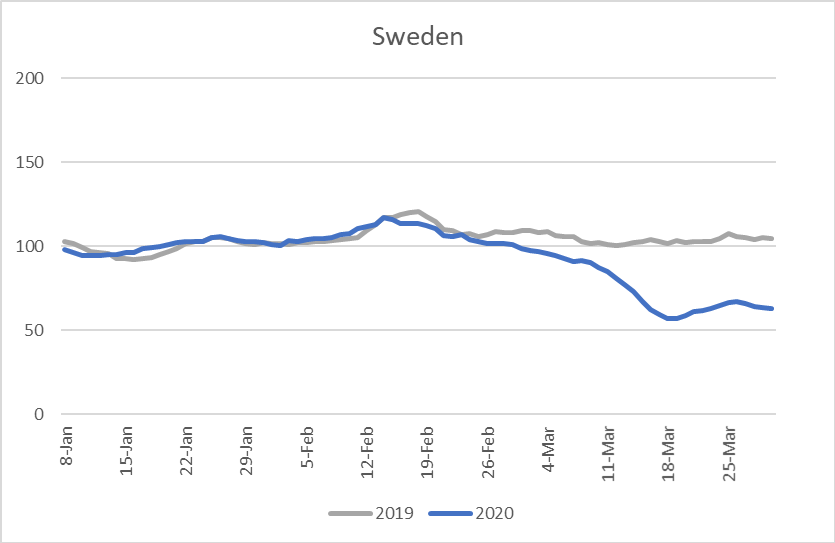
Source: Bruegel based on Google Trends.
Considerable differences in observance of lockdowns even before they formally took effect will contribute to different evolutions of the spread of the disease in different countries. When modelling infection curves, it is relevant to consider these voluntary actions, which took place ahead of required distancing.
Figure 4 shows the average of indexed searches in the day, three days, five days and seven days before introduction of national restaurant closures. Some countries already had partial restrictions in place, as shown in the charts above, which should be kept in mind when making comparisons:
Figure 4: Searches for restaurants vs. January average (100), 7, 5, 3 and 1 days before nationwide restaurant closures
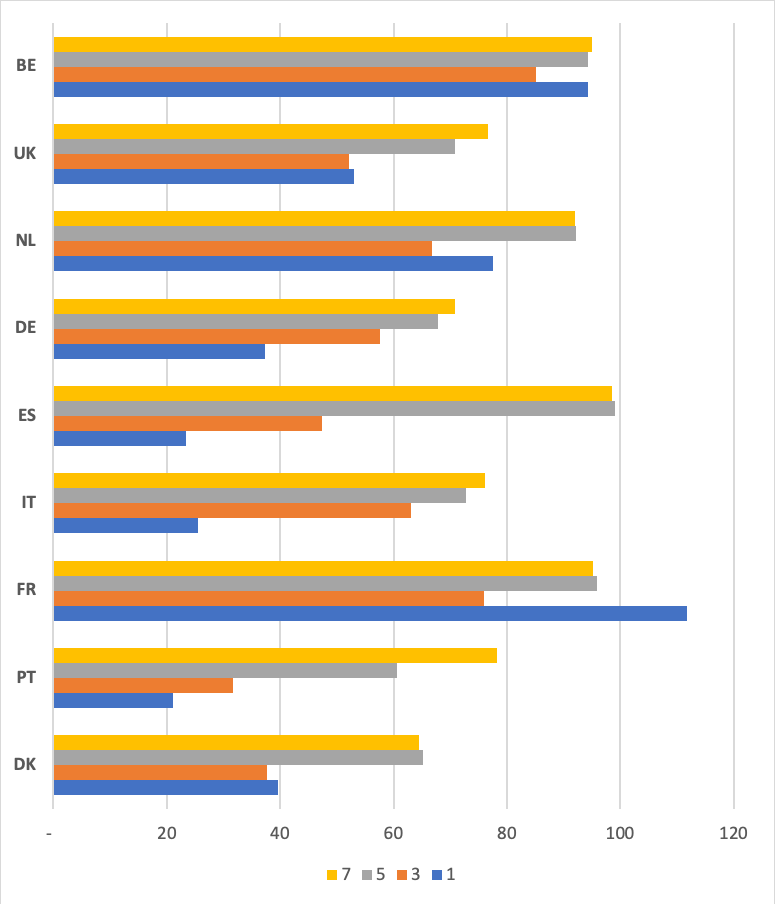
Source: Bruegel based on Google Trends.
In the UK, where strict measures were implemented only on 23 March, the preceding week’s daily searches were on average 30% lower than in January.
The figures show that even in the absence of government action, if individuals are informed about risk, they seem to choose to engage in social distancing (though reduced restaurant visits do not necessarily mean people were not gathering in other settings). As governments made announcements, people started engaging in social distancing, even before implementation. In countries where government action lags, individuals can promote distancing to help curb disease progression (with economic costs), if they are aware of the risks.
However, without an encompassing government response and appropriate social measures, individuals will be more susceptible to health risks since even if they avoid outside leisure, they are required to leave their homes to work and secure an income.
[1] We focus on ‘restaurant’ as a topic, not as a search term, which means the values should reflect whenever individuals search for any restaurant.
References
Toxvaerd, Flavio (2020) ‘Equilibrium Social Distancing’, Cambridge Working Papers in Economics: 2021, available at https://www.inet.econ.cam.ac.uk/working-paper-pdfs/wp2008.pdf
Republishing and referencing
Bruegel considers itself a public good and takes no institutional standpoint. Anyone is free to republish and/or quote this post without prior consent. Please provide a full reference, clearly stating Bruegel and the relevant author as the source, and include a prominent hyperlink to the original post.





